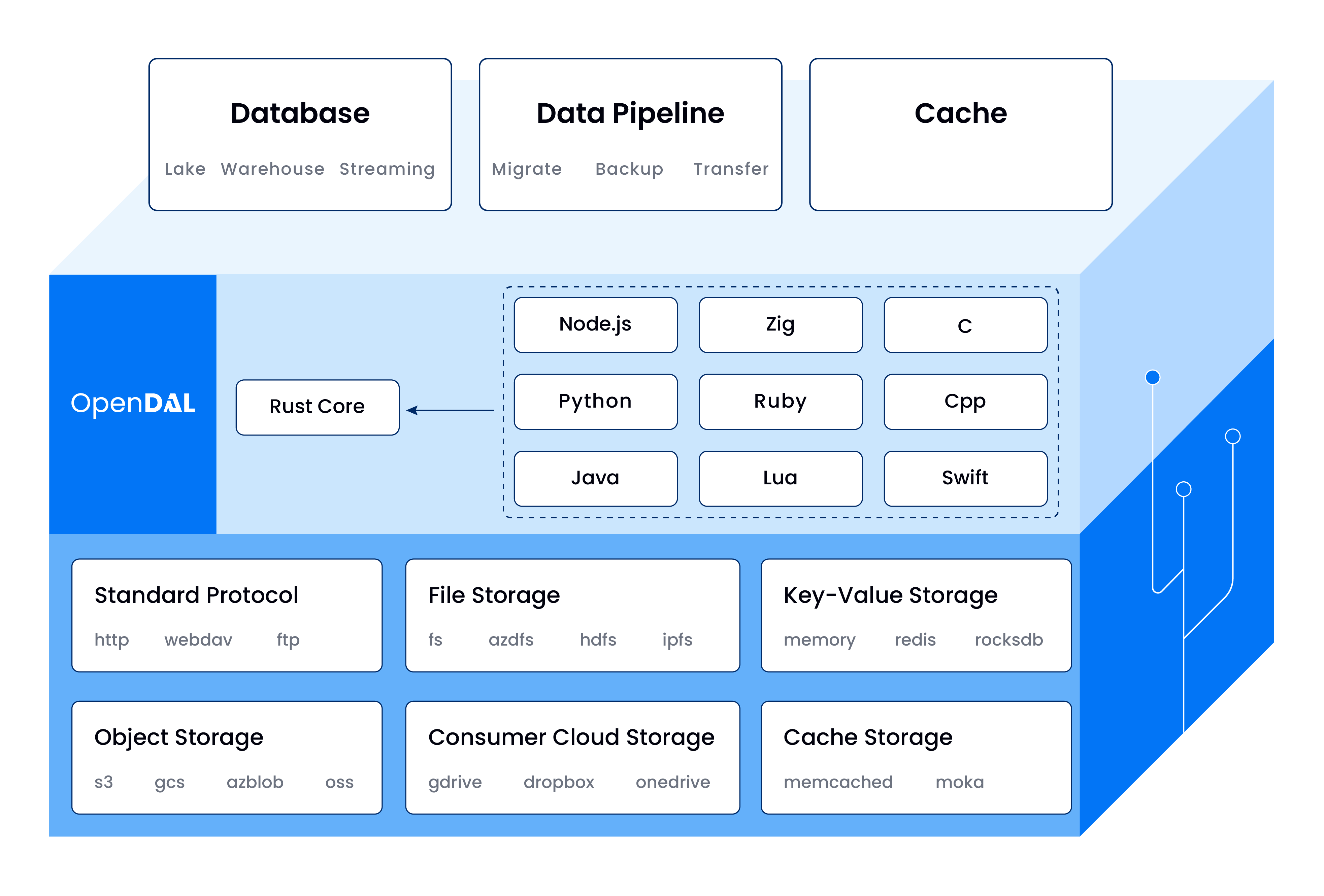Apache OpenDAL in Rust to Access Any Kind of Data Services
OpenDAL is a data access layer that allows users to easily and efficiently retrieve data from various storage services in a unified way such as S3, FTP, FS, Google Drive, HDFS, etc. They has been rewritten in Rust for the Core and have a binding from many various language like Python, Node.js, C, etc.

OpenDAL is designed for developers who need to build cloud-native, cross-cloud-first applications and services that require configurable storage backends to meet complex data access needs. With OpenDAL, developers can use a unified interface to access multiple storage backends, including cloud object storage, distributed file systems, and relational databases. This allows developers to easily switch between different storage backends without having to worry about the underlying implementation details.

Basic Usage
1. Via Builder
Typically, you will need to pick a Builder and configure it. After that, you initialize an Operator with the builder. This allows you to interact with the service, performing tasks such as reading or writing data.
For example, if we want to access to S3 Service
use opendal::{services, Operator};
#[tokio::main]
async fn main() -> Result<()> {
// Pick a builder and configure it.
let mut builder = services::S3::default();
builder.bucket("my-bucket");
// Init an operator
let op = Operator::new(builder)?.finish();
// Read data
let bs = op.read("hello.txt").await?;
Ok(())
}
Look at the Configuration section of each service so see the configuration keys to set for the service.
root: Set the work dir for backend.bucket: Set the container name for backend.endpoint: Set the endpoint for backend.region: Set the region for backend.access_key_id: Set the access_key_id for backend.secret_access_key: Set the secret_access_key for backend.- ...
2. Via Config
Another alternative is to create the Operator using a HashMap as a construction method. You can refer to the Operator documentation for more information. This approach allows you to initialize operators based on dynamic configurations.
use std::collections::HashMap;
use opendal::{services, Operator, Scheme};
#[tokio::main]
async fn main() -> Result<()> {
// Config
let map = HashMap::from([
("bucket".to_string(), "my-bucket".to_string()),
]);
// Init an operator
let op = Operator::via_map(Scheme::S3, map)?;
// Read data
let bs = op.read("hello.txt").await?;
Ok(())
}
Seeing more at the Rust doc https://docs.rs/opendal
Layers
OpenDAL also supporting layers like logging, prometheus, tracing, timeout, retry, etc.
use opendal::{services, Operator};
use opendal::layers::LoggingLayer;
#[tokio::main]
async fn main() -> Result<()> {
// Pick a builder and configure it.
let mut builder = services::S3::default();
builder.bucket("my-bucket");
// Init an operator
let op = Operator::new(builder)?
// Init with logging layer enabled.
.layer(LoggingLayer::default())
.finish();
// Read data
let bs = op.read("hello.txt").await?;
Ok(())
}
Look at some additional examples below
FS - File System
use std::collections::HashMap;
use opendal::{Operator, Scheme};
#[tokio::main]
async fn main() -> Result<()> {
let mut map = HashMap::new();
map.insert("root".to_string(), "/path/to/dir".to_string());
// Init an operator
let op: Operator = Operator::via_map(Scheme::Fs, map)?;
// Read data /path/to/dir/hello.txt
let bs = op.read("hello.txt").await?;
Ok(())
}
HTTP
use std::collections::HashMap;
use opendal::{Operator, Scheme};
#[tokio::main]
async fn main() -> Result<()> {
let mut map = HashMap::new();
map.insert("endpoint".to_string(), "127.0.0.1".to_string());
let op: Operator = Operator::via_map(Scheme::Http, map)?;
// Read data http://127.0.0.1/hello.txt
let bs = op.read("hello.txt").await?;
Ok(())
}
Example: function support to read CSV file from local/s3/http
use anyhow::{Context, Result};
use opendal::{Operator, Scheme};
use url::Url;
async fn read_file(path: &str) -> Result<()> {
// Extract the file name from the path
let file_name = path.split('/').last().unwrap_or_default();
// Local file, start with '/'
let (scheme, args) = if path.starts_with('/') {
let root = path.trim_end_matches(file_name).to_string();
(Scheme::Fs, {
let mut args = std::collections::HashMap::new();
args.insert("root".to_string(), root);
args
})
} else {
// Parse the URL to determine the scheme
let url = Url::parse(path)?;
// Determine the scheme and create OperatorArgs accordingly
match url.scheme() {
"file" => (Scheme::Fs, {
let mut args = std::collections::HashMap::new();
args.insert("root".to_string(), url.path().to_string());
args
}),
"http" | "https" => (Scheme::Http, {
let mut args = std::collections::HashMap::new();
args.insert(
"endpoint".to_string(),
url.host_str().unwrap_or_default().to_string(),
);
args
}),
"s3" => (Scheme::S3, {
let mut args = std::collections::HashMap::new();
args.insert(
"bucket".to_string(),
url.host_str().unwrap_or_default().to_string(),
);
if !url.path().is_empty() {
args.insert("key".to_string(), url.path()[1..].to_string());
}
args
}),
_ => {
return Err(anyhow::anyhow!("Unsupported scheme"));
}
}
};
// Create an Operator instance and read the CSV file
let op: Operator = Operator::via_map(scheme, args)?;
// Read the CSV file
let content = op
.read(file_name)
.await
.with_context(|| format!("Failed to read from: {}", path))?;
// For now, just print the data
println!("{:?}", content);
Ok(())
}
#[tokio::main]
async fn main() -> Result<()> {
read_file("/tmp/aaa").await?;
read_file("file:///tmp/aaa").await?;
read_file("https://example.com/path/to/http/file2.csv").await?;
read_file("s3://bucketname/path/to/s3/file3.csv").await?;
Ok(())
}
Get and run the example code in my repository on GitHub duyet/opendal-examples